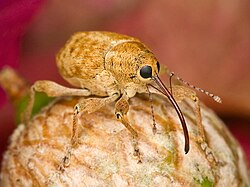Weevil
Weevils are herbivorous beetles. They have a long 'snout' at the front of their head, called a rostrum. Weevils are a family, the Curculionidae, which may be the largest beetle family, with about 45,000+ named living species. That makes it the largest family in the animal kingdom.[1] In addition, the superfamily Curculionoidea has ten more families of closely related weevil-type beetles.
| Weevils | |
|---|---|

| |
| The Filbert weevil, Curculio occidentis, a pest of oak trees | |
| Scientific classification | |
| Kingdom: | |
| Phylum: | |
| Class: | |
| Subclass: | |
| Infraclass: | |
| Superorder: | |
| Order: | |
| Suborder: | |
| Family: | Curculionidae
|

Damaging pests
changeThe family has some pests which damage plants of interest to humans. The most famous weevil is the boll weevil, which ruins cotton crops.
The Ips genus, feeding on Ponderosa pine, introduces a fungus to the tree. The fungus blocks resin canals, which leaves the weevil free to eat. Resin would normally wash the insects out; it is a defence mechanism. The fungus often kills the tree, and groups of dead trees are a focus for forest fires. In this way the insect is indirectly responsible for serious fires.[2][3]
The maize weevil, Sitophilus zeamais, is a major pest. It attacks both standing crops and stored cereal products, including wheat, rice, sorghum, oats, barley, rye, buckwheat, peas, and cottonseed.
Families
change- Anthribidae—fungus weevils
- Attelabidae—leaf rolling weevils
- Belidae—primitive weevils
- Brentidae—straight snout weevils
- Caridae
- Curculionidae—true weevils
- †Mesophyletidae
- Nemonychidae—pine flower weevils
- †?Obrieniidae
New species
changeOver 100 new species of weevil have been found on the Indonesian island of Sulawesi.[4]
References
change- ↑ John L. Foltz (1998). "Coleoptera: Curculionidae". Archived from the original on August 29, 2010.
- ↑ David Grimaldi & Michael S. Engel 2005. Evolution of the insects. Cambridge University Press. p359 ISBN 0-521-82149-5
- ↑ Legalov, Andrei A. 2020. Fossil history of Curculionoidea (Coleoptera) from the Paleogene. Geosciences 10 (9): 358. Bibcode:2020Geosc..10..358L. doi:10.3390/geosciences10090358
- ↑ Briggs, Helen 2019. Treasure trove of new insects discovered on island. BBC News Science and Environment. [1]